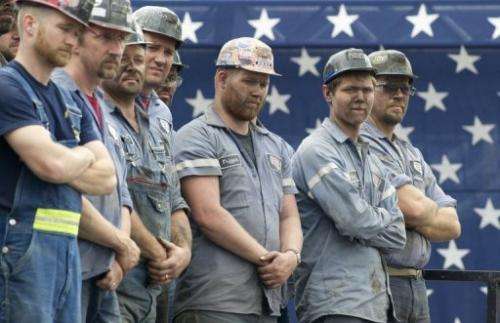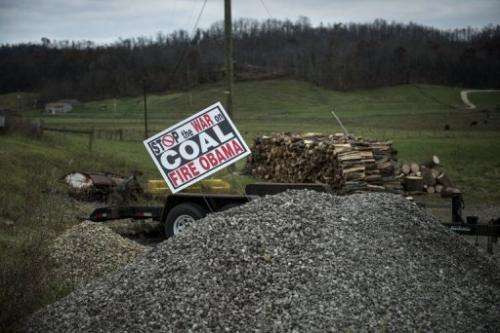Coal fights to keep power in US energy mix

Four months after pledging to lead the United States on a path to sustainable energy, President Barack Obama faces a turning point on electricity generated from coal, one of the dirtiest of fuels.
The White House was expected this week to finalize a rule to reduce emissions from all new coal-fired plants. But mixed signals on whether it will be enacted have led environmentalists to prepare litigation to force action.
The rule was due to be finalized April 13.
But the Environmental Protection Agency, in charge of crafting and implementing the rule change amid some hefty opposition from the coal industry, told AFP this week that there is no timeline for completing it.
The uncertainty underscores the difficulty in achieving the downsizing of coal-fired electricity that environmentalists say is needed to address climate change.
Rather than being phased out, politically powerful coal, backed by dedicated support from coal-state lawmakers on Capitol Hill, is clinging to its place in the energy mix, pushing back against the Obama administration's measures and promoting new infrastructure to boost coal exports.
Last month, Senator Joe Manchin of West Virginia organized a campaign to pressure Obama to amend the power-plant rule to ease the requirements for new plants.
Even without the new rule, coal use has been on the decline domestically. The share of coal-fired power in the US energy mix dropped from 48.5 percent in 2007 to 37.4 percent in 2012.
During the same period, natural gas, which emits about half as much carbon as coal, increased from 21.6 percent to 30.4 percent.

Natural gas has benefited from more competitive prices, thanks to the phenomenal rise of shale gas supplies, and the tougher environmental regulations on coal.
Still, experts disagree on the prospects for the industry.
"We suspect in the coming years there is likely to be lots of headline risk for carbon. But we see very little real restrictions likely," said a recent report from Jefferies that urged investors to buy coal industry equities.
But Divya Reddy, an analyst at risk consultant Eurasia Group, predicted the long-term role of coal will "erode" as new environmental rules take effect.
Even so, government experts say coal will be a major part of the mix for decades to come.
The Energy Information Administration projects US coal use will increase four percent between 2011 and 2040.
"We expect eventually gas prices are going to start edging back up," said Alan Beamon, director of the EIA's office of Electricity, Coal, Nuclear and Renewable Analysis.
"And so some of the old coal plants will eventually recapture some of the market they used to serve."
There are signs that coal is already recovering some of its market share, thanks to a doubling of natural gas prices in the past year.
Coal producer Peabody Energy said demand "rebounded sharply" in the second half of 2012 and predicted higher coal consumption in 2013.
The political battle has also extended to coal exports, which in 2012 approached historic highs. Emerging economies like China and India are huge coal consumers and Japan and some European countries are turning to coal to offset nuclear closures.
Coal miners are pushing to build new transport and port facilities to expand exports, but those ideas are running into stiff environmental opposition.
Advocacy group Friends of the Earth urged rejection of proposed sites in the Pacific Northwest, arguing "the dangers of coal exports affect our communities, health and entire planet."
Four ports have been proposed in Oregon and Washington states. "The confidence is relatively high that one or more will be built," said Bob Hodge, editor of IHS Energy Publishing.
But a Eurasia Group note pointed to an "uptick in noise" surrounding the controversial projects and predicted a "lengthy approval process."
(c) 2013 AFP

















